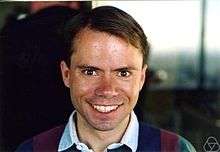Scott Sheffield
Scott Sheffield (born October 20, 1973) is a professor of mathematics at the Massachusetts Institute of Technology.[1] His primary research field is theoretical probability.
Scott Sheffield | |
|---|---|
 | |
| Born | October 20, 1973 |
| Nationality | American |
| Alma mater | Stanford University |
| Awards | Loève Prize (2011) Rollo Davidson Prize (2006) Clay Research Award (2017) |
| Scientific career | |
| Fields | Mathematician |
| Institutions | MIT |
| Thesis | Random surfaces: large deviations and gradient Gibbs measure classifications (2003) |
| Doctoral advisor | Amir Dembo |
| Website | math |
Research
Much of Sheffield's work examines conformal invariant objects which arise in the study of two-dimensional statistical physics models. He studies the Schramm-Loewner evolution SLE(κ) and its relations to a variety of other random objects. For example, he proved that SLE describes the interface between two Liouville quantum gravity surfaces that have been conformally welded together.[2] In joint work with Oded Schramm, he showed that contour lines of the Gaussian free field are related to SLE(4).[3][4] With Jason Miller, he developed the theory of Gaussian free field flow lines, which include SLE(κ) for all values of κ, as well as many variants of SLE.[5]
Sheffield and Bertrand Duplantier proved the Knizhnik-Polyakov-Zamolodchikov (KPZ) relation for fractal scaling dimensions in Liouville quantum gravity.[6] Sheffield also defined the conformal loop ensembles, which serve as scaling limits of the collection of all interfaces in various statistical physics models.[7] In joint work with Wendelin Werner, he described the conformal loop ensembles as the outer boundaries of clusters of Brownian loops.[8]
In addition to these contributions, Sheffield has also proved results regarding internal diffusion limited aggregation, dimers, game theory, partial differential equations, and Lipschitz extension theory.[9]
Teaching
Since 2011, Sheffield has taught 18.600 (formally 18.440), the introductory probability course at MIT.[10]
Education and career
Sheffield graduated from Harvard University in 1998 with an A.B. and A.M. in mathematics. In 2003, he received his Ph.D. in mathematics from Stanford University. Before becoming a professor at MIT, Sheffield held postdoctoral positions at Microsoft Research, the University of California at Berkeley, and the Institute for Advanced Study. He was also an associate professor at New York University.[11]
Awards
Scott Sheffield received the Loève Prize, the Presidential Early Career Award for Scientists and Engineers, the Sloan Research Fellowship, and the Rollo Davidson Prize. He was also an invited speaker at the 2010 meeting of the International Congress of Mathematicians. In 2017 he received the Clay Research Award jointly with Jason Miller.[12]
Books
- Scott Sheffield (2005), Random Surfaces, American Mathematical Society[13]
References
- http://math.mit.edu/people/profile.php?pid=243, MIT, retrieved 2013-23-08.
- Conformal weldings of random surfaces: SLE and the quantum gravity zipper, Scott Sheffield, 2010, https://arxiv.org/abs/1012.4797
- Contour lines of the two-dimensional discrete Gaussian free field, Oded Schramm and Scott Sheffield, 2006, https://arxiv.org/abs/math/0605337
- A contour line of the continuum Gaussian free field, Oded Schramm and Scott Sheffield, 2010, https://arxiv.org/abs/1008.2447
- Imaginary Geometry I: Interacting SLEs, Jason Miller and Scott Sheffield, 2012, https://arxiv.org/abs/1201.1496
- Liouville Quantum Gravity and KPZ, Bertrand Duplantier and Scott Sheffield, 2008, https://arxiv.org/abs/0808.1560
- Exploration trees and conformal loop ensembles, Scott Sheffield, 2006, https://arxiv.org/abs/math/0609167
- Conformal loop ensembles: the Markovian characterization and loop soup construction, Scott Sheffield and Wendelin Werner, 2010, https://arxiv.org/abs/1006.2374
- 2011 Loève Prize announcement, http://www.stat.berkeley.edu/users/aldous/Research/sheffield.pdf
- http://math.mit.edu/~sheffield/teach.html
- http://math.mit.edu/~sheffield/cv.html, MIT, retrieved 2013-23-08
- Clay Research Award 2017
- Sheffield, Scott (2005). Random surfaces. Société mathématique de France. p. vi+175. ISBN 2856291872. Retrieved 21 September 2019.